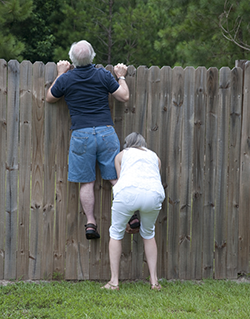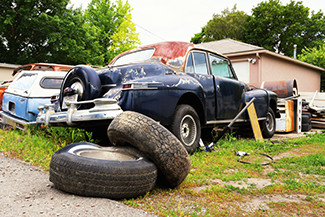Finding Harmony Among Difficult Neighbors
 25 January 2022
25 January 2022 

How To Find Harmony Among Difficult Neighbors
We all have one, maybe more – the neighbor who drives you nuts.
How do you avoid ending up in a house with such neighbors? How do you deal with them if they just moved in or after years of putting up with their shenanigans, how do you make them stop?
Let’s start by visiting them -- briefly.
The Rubberneck
 This neighbor knows (or thinks they know) everything that’s happening in the neighborhood. From what time you came home last night to what's in your trash bin, this one is a little too curious.
This neighbor knows (or thinks they know) everything that’s happening in the neighborhood. From what time you came home last night to what's in your trash bin, this one is a little too curious.
The upside of having a neighbor watching what’s going on is that someone is paying attention.
The Bickersons
These folks are always in a loud argument that sounds like WWE Smackdown. You know more about them than you want to.
The Party Animals
These neighbors have a get-together every weekend, if not during the week, and they don’t even invite you. A street of cars, loud music, and a trash bin full of pizza boxes and beer cans is their calling card.
The Hermits
Not quite the Herman’s Hermits you may have sung along to. They are more like the Klopeks from The ‘Burbs. This is the neighbor you rarely see or hear. You can only imagine what is happening in that house.
The Tattletales
These folks call the police for every incident they don’t approve of. Dogs barking, loud music, too many kids running around -- it doesn’t matter. They have 911 on speed dial and the dispatchers are just as annoyed with them as you are.
The Junk Yard
 Sanford & Son's junkyard looked immaculate compared to these people. They have everything on their lawn from “art” to old couches, junked cars, and anything else they can’t squeeze into their house.
Sanford & Son's junkyard looked immaculate compared to these people. They have everything on their lawn from “art” to old couches, junked cars, and anything else they can’t squeeze into their house.
The Dog Catcher
This neighbor is constantly chasing after or yelling for their dog, often doing it in their skivvies.
The Never-Ending Yard Sale
It's like there's a Blue Light Special every few weeks. They haul whatever goods they picked up at other yard sales and put it out for sale in their yard. With the goods, comes extra traffic and noise.
Resolving Neighborly Conflict
How can you resolve conflict before it gets out of control and reaches the legal system? HOA Resources offers these tips taken from questions and comments from community association members living in condominiums, homeowners associations, and housing cooperatives. However, these tips are also helpful for those living outside these types of communities.
Say hello. At the mailbox, while walking the dog, or when you see a moving van arrive, introduce yourself. Learn your neighbors' names and regularly offer a friendly greeting.
Provide a heads up. If you’re planning a construction project, altering your landscaping, or hosting a big party, contact your neighbors beforehand.
Do unto others. Treat neighbors as you would like to be treated. Be considerate about noise from vehicles, stereos, pets, etc.
Know your differences. Make an effort to understand each other. Differences in age, ethnic background, and years in the neighborhood can lead to different expectations or misunderstandings.
Consider the view. Keep areas of your property that others can see presentable.

Appreciate them. If the neighbors do something you like, let them know. They’ll be pleased you noticed, and it’ll be easier to talk later if they do something you don’t like.
Stay positive. Most people don’t try to create problems. If a neighbor does something that irritates you, don’t assume it was deliberate.
Talk honestly. Tolerance is important, but don’t let a real irritation go because it seems unimportant or hard to discuss. Let your neighbors know if something they do annoys you.
Be respectful. Talk directly to your neighbors if there’s a problem. Gossiping with others can damage relationships and create trouble.
Remain calm. If a neighbor mentions a problem they have with you, thank them for the input. You don’t have to agree or justify any behavior. Wait for any anger to subside before responding.
Listen carefully. When discussing a problem, try to understand your neighbor’s position and why he or she feels that way.
Take your time. Take a break to think about what you and your neighbor have discussed. Arrange to finish the conversation at another time.
When You Can’t Resolve a Conflict
Sometimes you can’t agree or get a neighbor to stop whatever it is that is causing conflict. In that case, you may need to call in a third party to mediate.
Keep a journal of dates and times of ongoing offenses. Install a surveillance camera so you will have evidence to bring forth to the authorities, the HOA, or an attorney.
Consider using a mediator to help resolve your differences. Locate a mediator through the National Association of Community Mediation. Mediation will help you find a solution so each of you gets what you need to live more harmoniously.
Keep in mind that if you go to a third party to resolve the conflict, the chances of you sharing cocktails on the patio or exchanging holiday cookies are slim to none.
Before You Buy
 There is only so much you can see and hear about a neighborhood when at a showing. Before signing on the final dotted line, do some reconnaissance.
There is only so much you can see and hear about a neighborhood when at a showing. Before signing on the final dotted line, do some reconnaissance.
“Weekends and after work hours the best way learn more about a neighborhood,” says Rosie on the House Certified Partner, Joelle Kahn, Realtor with Tierra Antigua Realty. “Drive around the neighborhood. Speak with the neighbors. Find out who the ‘mayor’ is. The mayor will tell you how great it is. On the other hand, the ‘gossip hound’ will tell you how loud it is and other issues.”
In addition to talking with neighbors, Kahn also suggests spending time in the neighborhood at different times to see who is coming and going and the general activity in the neighborhood. You will get a real sense of the area and see the red flags such as:
Unkempt houses. Is their pride of ownership in the neighborhood?
“Chickens are a big deal,” Kahn says. “If someone has a rooster or other loud animals, will you be able to deal with it?”
Graffiti can be as simple as neighborhood kids being obnoxious, but it can also be a sign of gang activity, which is a serious safety concern. If the graffiti isn’t removed quickly, more will likely follow and make the neighborhood an eyesore.
Look for trash bins that have not been taken in or are overflowing.
Helpful Resources
You can find out what’s happening in any neighborhood including crime statistics and registered sex offenders. Check out these websites.
In addition to connecting with your neighbors, posting a lost pet, or finding deals in the marketplace, Nextdoor allows you to hear directly from the people who live in a particular neighborhood. If you are already on it, you will need to update your neighborhood in the profile.
SpotCrime is a public-facing crime map and crime alert service. Check crime anywhere in the United States and many other countries worldwide. Easily look up city and county crime data and reports -- down to local neighborhood statistics. This is also a helpful tool when planning travel. Check out the crime statistics of the area you are planning to visit and stay in.
Arizona Department of Public Safety and City-Data.com allows you to look up registered sex offenders by neighborhood.
Pay attention to signs that the neighborhood in which your dream house sits has issues. Do your homework before you buy.
Don’t let animosity fester. Deal with issues as soon as they become a problem, and find solutions so you and your neighbors can live side-by-side harmoniously.
###
Podcast
Dr. Chad Wilson of East Valley Institute Of Technology talks about a one day event to encourage anyone to consider a career in the building sciences. Bridges Connor of Rosie-Certified Get Organized With Bridges & Co. joins in on our quest of finding harmony with difficult neighbors. January is GO Month (Get Organized); Bridges discusses how tough it can be but there's light at the end of the tunnel to getting things in place and tossing out what you don't need anymore. Did you know that an Estate Sale doesn't mean the owner passed away? That's right!
Photo Credit
- Shutterstock
Related Content
- Blog: Who Are The People In Your Neighborhood?
- Blog: The Front Porch Is Key To Neighborly Connections
- Blog: Contractors & Service Providers Can Improve Your Popularity
- Podcast: Who Are The People In Your Neighborhood?
- Podcast: The Front Porch Is Key To Neighborly Connections
- Podcast: Contractors & Service Providers Can Improve Your Popularity
Print this page
recent post
- Duck, Duck, Duct! How Often Should Ductwork Be Cleaned?
- Vinyl vs. Fiberglass Windows: Which Is The Better Choice Of Replacement Window?
- We May Be The Grand Canyon State, But The Rocky Mountains Are Important For Arizona
- Welcome to Arizona! Things A Newbie to Arizona Should Know
- The Pros & Cons of Buying A Flipped House
- Getting In On The Ground Floor
- Why It’s More Critical Than Ever To Get Your AC Serviced Before Summer
- The Reality of Remodeling
- What To Look For When Comparing Your Roofing Quotes
- What To Expect When Buying New Windows & Doors
